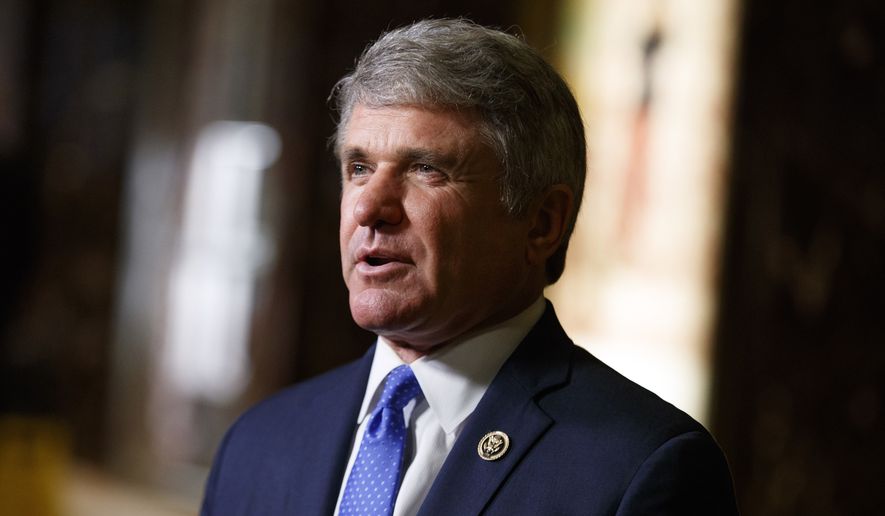Capitol Hill lawmakers are scrambling to prepare for the prospect that the historic summit between President Trump and Kim Jong-un will set in motion a much longer diplomatic process fraught with tense follow-on negotiations and potentially delicate nuclear inspections.
Congressional sources say there’s bipartisan support for giving Mr. Trump space to further the dialogue with Pyongyang, but that many lawmakers are wary about allowing negotiations to proceed without serious and formal weigh-in from Capitol Hill.
While the Trump administration has signaled its intention to seek at least some form of congressional approval for any final deal with North Korea, several lawmakers want direct oversight of whatever process unfolds toward the achievement of such a deal.
House Democrats and Republicans began pushing legislation last week that would require the administration to deliver detailed and regular reports to Congress on the core parameters for measuring progress of future negotiations with North Korea.
The bill would order the White House to provide information on “the status of the DPRK’s nuclear program” and update that information every 180 days.
“As President Trump advances denuclearization negotiations with North Korea, Congress must provide aggressive oversight,” said the House Homeland Security Committee’s Republican chairman, Rep. Michael McCaul, who co-sponsored the bill.
Rep. Eliot Engel, a New York Democrat, who also co-sponsored as ranking member of the House Foreign Affairs Committee, added that “successful negotiation with North Korea requires understanding what the country’s capabilities are now.”
“Implementation of any potential deal requires tough verification that the Kim Regime is actually dismantling its weapons,” he said. “This bill will establish that baseline and help ensure that we hold Pyongyang to its obligations in any future agreement.”
Other co-sponsors included Republican Reps. Ted Yoho and Steve Russell, of Florida and Oklahoma, respectively, and Democrat Reps. Brad Sherman and Ted Lieu California.
The bipartisan bill comes amid behind-the-scenes concern that Mr. Trump may be so eager to cut a deal that he offers unwarranted concessions to Mr. Kim. Some lawmakers are also worried about the long-term implications of a major international agreement reached without explicit congressional approval.
Analysts have drawn comparisons to the Iran nuclear deal, which the Obama administration pushed through with other world powers — including China, Russia and the European Union — without a vote of approval by the U.S. House or Senate.
The result saw 2015 accord as an executive agreement rather than a treaty, which would have required a two-thirds vote by the Senate to achieve ratification. The absence of such ratification contributed to the relative ease with which Mr. Trump was recently able to withdraw the U.S. from the deal just three years after it got reached.
Several lawmakers and analysts maintain a lack of rigorous input from Congress allowed the Obama administration to embrace a bad deal with Iran to begin with — something Mr. Trump has emphasized as justification for his pullout from the accord.
With that as a backdrop, Secretary of State Mike Pompeo has said the administration is “hoping to submit a document that Congress would have a say in” with regard to any deal with Pyongyang. He added congressional approval would give “comfort” to Mr. Kim that the deal won’t be easily overturned by a future administration.
Mr. Pompeo’s comments came after Sen. James Risch, Idaho Republican, said he was given personal assurances from Mr. Trump, Vice President Mike Pence and Mr. Pompeo that “it is there intent to craft this in such a way that it is a treaty” that will be submitted for Senate verification.
A high-level congressional official, meanwhile, told The Washington Times that most Republican lawmakers would likely be satisfied with the treaty approach. “My sense is they want to give the White House as much latitude as they can and don’t want to legislate these negotiations in the near term,” said the official, who spoke on condition of anonymity.
But there are separate concerns lingering about North Korea’s history of reneging on past agreements with Washington and other world powers over the nuclear weapons program that Pyongyang has spent decades building despite repeated U.N. Security Council resolutions demanding a halt to the activities.
The last major push for diplomacy with North Korea — an effort that included direct involvement of Chinese, Russian, Japanese and U.S. negotiators — fell apart in 2009, roughly four years after Pyongyang had explicitly committed to “abandoning all nuclear weapons and existing nuclear programs.”
Some lawmakers are homing in on that history.
“This process will require vigorous enforcement to ensure we don’t fall prey to the same mistakes of the past,” said Rep. Lieu, one of the house bill’s co-sponsors.
• Guy Taylor can be reached at gtaylor@washingtontimes.com.




Please read our comment policy before commenting.